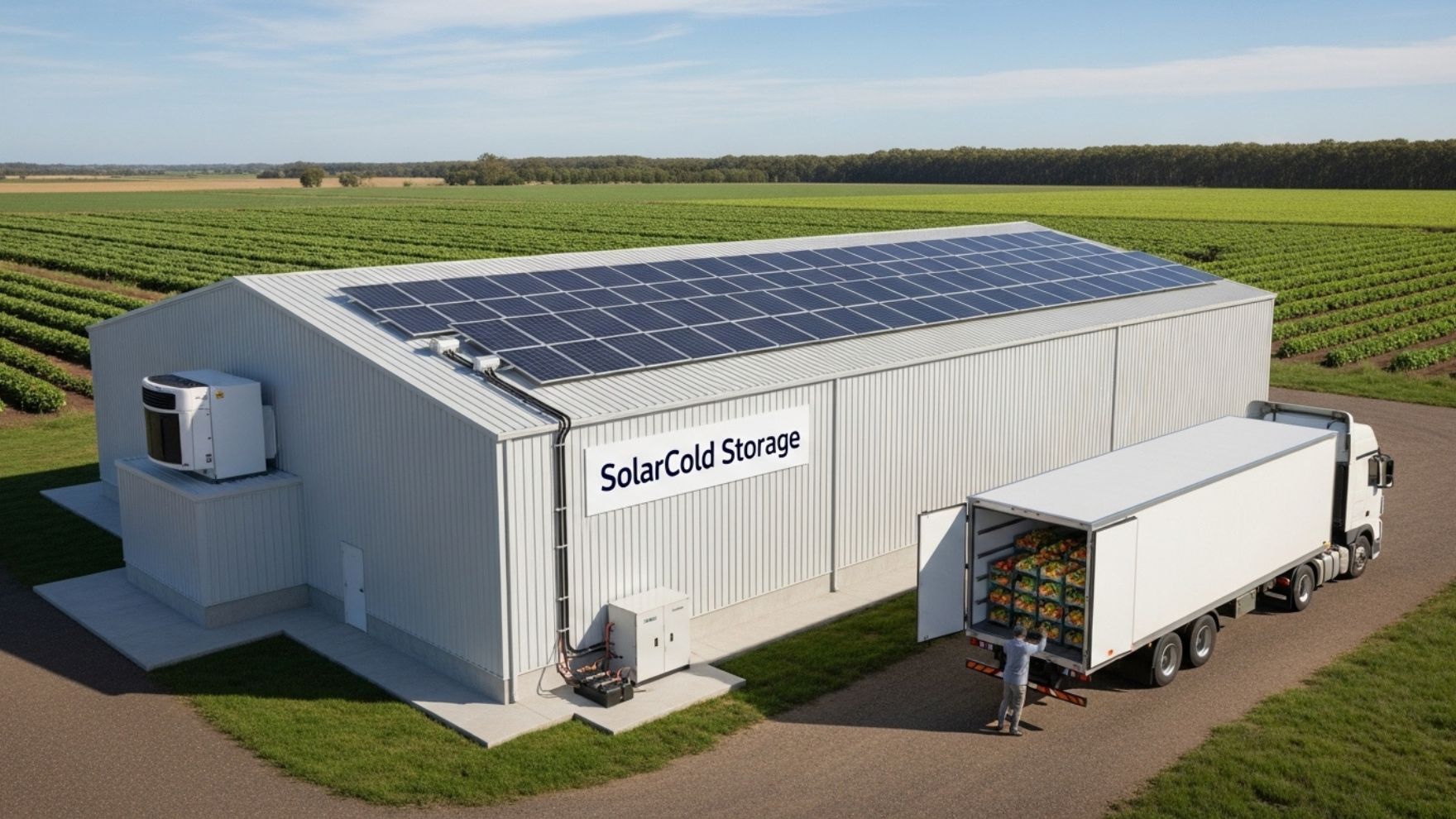Solar-powered cold storage has emerged as one of the most trans-formative solutions for Tamil Nadu’s agrarian economy in 2025. With agriculture continuing to serve as the backbone of the state’s economy, innovations in post-harvest preservation are proving vital to reducing wastage, increasing profitability, and improving sustainability. As climate change intensifies and energy costs rise, solar cold storage systems are enabling Tamil Nadu’s farmers to protect their produce efficiently, sustainably, and affordably.
Introduction: Tackling Food Wastage with Solar Innovation
Tamil Nadu produces vast quantities of perishable commodities—bananas, mangoes, tomatoes, milk, and flowers—that require continuous refrigeration. However, according to the Central Institute of Post-Harvest Engineering and Technology (CIPHET), nearly 30–40% of perishable farm produce in India goes to waste each year due to inadequate cold storage facilities. This translates to losses of around ₹92,000 crore annually.
Conventional cold storage units depend heavily on diesel generators or unstable grid connections. This model increases operational costs and carbon emissions, making it unsustainable for small-scale farmers. Solar-powered cold storage—driven by Tamil Nadu’s abundant sunshine—offers a breakthrough alternative. It ensures uninterrupted cooling while significantly cutting down energy expenses and emissions.
What Is Solar-Powered Cold Storage?
A solar-powered cold storage system uses photovoltaic (PV) panels to generate electricity that runs refrigeration units. These units are designed to maintain specific low temperatures, preserving agricultural produce after harvest.
How It Works:
- Solar Generation: Solar panels capture sunlight and convert it into electrical energy.
- Power Supply: The generated energy powers the refrigeration compressor and other components.
- Thermal Energy Storage (TES): Excess daytime power is stored in a thermal battery or phase change material (PCM), maintaining cooling even during nighttime or cloudy days.
- Smart Controls: Advanced units include IoT sensors to regulate temperature, humidity, and backup status via mobile apps and alerts.
Institutions like IIT Madras, in collaboration with Murugappa Chettiar Research Center, have developed portable solar-powered cold storage solutions specifically suited for Tamil Nadu’s small and marginal farmers.
Read Also: post-harvest preservation solar
The Growing Need in Tamil Nadu
Tamil Nadu’s agro-climatic diversity supports horticulture, dairy, and floriculture sectors, but post-harvest losses remain a barrier to rural prosperity. The summer heat, reaching above 40°C in interior regions, makes it even harder to preserve produce like milk, grapes, and leafy vegetables.
Key State Statistics:
- Tamil Nadu contributes 6% of India’s horticultural output, with districts like Salem, Theni, and Krishnagiri leading in fruit and vegetable cultivation.
- Roughly 41% of produced perishables never reach the market in optimal condition due to the lack of cold chain infrastructure.
- Electricity fluctuations in rural areas worsen the situation, highlighting the importance of renewable energy-based storage.
Solar-powered cold storage offers smallholder farmers an affordable way to store crops for a longer duration and sell them during off-peak supply periods to maximise profit margins.
Benefits of Solar-Powered Cold Storage for Farmers
1. Reducing Post-Harvest Losses
Farmers in Tamil Nadu often face spoilage of products like bananas, tomatoes, and milk within hours of harvest. Solar-powered cold storage can extend shelf life by 7–21 days, preventing spoilage during transportation or market delays.
2. Increasing Farmer Incomes
By safely storing produce, farmers can wait for better market prices instead of selling at harvest time when prices drop. This often leads to a 20–30% increase in farm income, according to emerging case studies from pilot projects in Kancheepuram and Thanjavur.
3. Environmentally Sustainable
Unlike diesel-based cold rooms, solar-powered models operate without fossil fuels. This reduces operational emissions and aligns with India’s 2070 carbon-neutrality goal.
4. Affordable Operation with Pay-Per-Use Models
Startups and cooperative enterprises like Tan90, Inficold, and Ecofrost now offer shared or rental cold storage models in Tamil Nadu. Farmers can access the facility when needed without owning it—revolutionizing the accessibility of cold chain services.
5. Empowering Rural Women and Youth
Solar cold storage creates local employment opportunities, as rural youth and women’s self-help groups are increasingly trained to manage and repair the units.
Government Initiatives Supporting Solar Cold Storage
In 2025, the Ministry of New and Renewable Energy (MNRE) released official guidelines under the framework “Design Specifications and Testing Procedures for Solar Cold Storage with Thermal Energy Backup.” These regulate the technical standards, energy performance, and safety norms for all solar cold room setups nationwide.
Key Features of MNRE’s 2025 Guidelines:
- Use of solar PV panels with TES backup to ensure 24×7 cooling availability.
- Mandatory Phase Change Material (PCM) for sustainable energy storage.
- Subsidies and technical support under programs like KUSUM Component B and C.
- Integration with Farmer Producer Organizations (FPOs) and cooperatives to improve scalability.
Through schemes like the Agriculture Infrastructure Fund (AIF) and National Horticulture Board programs, farmers can receive up to 35% subsidy on cold storage infrastructure.
Tamil Nadu’s Model Projects and Startups
IIT Madras and Murugappa Chettiar Research Center
An IIT-M incubated startup, Tan90, has successfully established a solar cold storage prototype in Madurantakam, Kanchipuram District. The portable unit, capable of holding 300–500 kg of produce, maintains temperatures required for fruits, vegetables, dairy, and even vaccines.
This project serves as a model for small-scale farmers seeking affordable solutions. The innovation uses thermal batteries instead of costly lithium-ion batteries, reducing maintenance and operational costs.
Inficold: The Industry Pioneer
Inficold has become a national leader in solar refrigeration, providing hybrid systems combining grid power, solar PV, and thermal energy storage. Its small-capacity models are now being adopted by tomato and milk cooperatives across southern Tamil Nadu.
Trichy Hybrid Cold Storage Initiative
A state-backed research project in Trichy has demonstrated the viability of combining 220 kWp solar PV capacity with a 15 m³ TES tank using Phase Change Material. This design reduced annual energy use by nearly 30%, proving an efficient decentralised model for Tamil Nadu’s agri-export clusters.
Key Components of a Solar Cold Storage System
| Component | Function | Tamil Nadu Example |
| Solar Panels | Capture sunlight and generate electricity | High-efficiency monocrystalline panels suited for hot climates |
| Inverter | Converts DC into usable AC power | Hybrid inverter to allow grid-tie in Trichy systems |
| Thermal Energy Storage | Maintains cooling during non-sunny hours | PCM tanks installed in Tan90 prototypes |
| Refrigeration Unit | Controls temperature and humidity | Modular cold chamber at 4°C for vegetables, 10°C for fruits |
| IoT Sensors | Remote performance monitoring | Mobile-accessible apps tracking humidity and temperature |
Economic and Social Impact in Tamil Nadu
Improved Profitability and Food Security
Farmers storing perishable produce like onions, greens, and milk report drastic decreases in spoilage rates. The ability to time their sales allows them to capture seasonal price differences, often improving profit margins by over 25%.
Local Job Creation
Solar cold storage units promote rural entrepreneurship, encouraging FPOs, cooperatives, and youth clubs to manage shared storage models. Women’s self-help groups (SHGs) in Namakkal and Perambalur have already been enlisted to operate community-level cold rooms.
Export-Oriented Agriculture
Low-cost storage solutions allow Tamil Nadu’s agri-exporters to maintain product quality during transit, strengthening the state’s reputation in global mango and flower markets.
Challenges Facing Solar Cold Storage Adoption
While innovation and awareness are increasing, some hurdles persist:
- High Upfront Investment: Costs still range from ₹5 to ₹8 lakh per unit, though decreasing rapidly with subsidies.
- Limited Awareness: Many smallholder farmers remain unaware of available financial aids.
- Maintenance Issues: Skilled technicians are needed for timely service in remote villages.
- Battery Costs: When lithium-ion storage is preferred over PCM, initial expenses rise.
Financial Viability and Payback Period
A financial model for a 5 Metric Tonne cold storage facility in Tamil Nadu reveals strong economic value:
- Installation Cost: ₹15–18 lakh
- Central Subsidy: 35% (NHM/AIF support)
- Annual Revenue: ₹5–6 lakh from rental and produce preservation
- Payback Period: 3.5–4 years
Hybrid solar-TES solutions further cut operational expenses by nearly 40%, improving ROI for FPOs and cooperatives.
Read Also: The Status of Large-Scale Solar Projects in the UK 2025: Growth, Challenges & Future Outlook
Future Outlook for Tamil Nadu
With continuous government and academic collaboration, Tamil Nadu aims to create 200 integrated solar cold storage hubs by 2030, under its renewable agricultural infrastructure mission. These hubs will be strategically located in major crop belts like Krishnagiri, Erode, Cuddalore, and Madurai.
Startups backed by IITs, NABARD, and MNRE funding will continue scaling portable cold storage models to reach even the remotest farmers.
Conclusion
Solar-powered cold storage is more than just a technical innovation—it represents a socio-economic revolution for Tamil Nadu’s farmers. By harnessing renewable energy to address post-harvest challenges, this technology is helping farmers reduce waste, secure better prices, and embrace sustainability.
With government backing, strong startup involvement, and community participation, Tamil Nadu is set to become a model state in combining solar energy, technology, and agriculture for a greener, more prosperous future.
FAQs
Q1. How does solar cold storage work at night?
Using thermal or battery energy storage, excess energy produced in the daytime is stored and used for cooling after sunset.
Q2. What is the average cost of installing a solar cold storage unit in Tamil Nadu?
Depending on size and features, it ranges from ₹5–18 lakh. Government subsidies reduce this by up to 35%.
Q3. Who provides financial support for solar cold storage in Tamil Nadu?
Schemes like the Agriculture Infrastructure Fund (AIF), KUSUM, and NABARD loans provide funding and grants.
Q4. Are there mobile or portable versions of solar cold storage available?
Yes, initiatives like IIT-M’s Tan90 have launched portable models designed for small farmers.
Q5. How much can farmers increase income with solar storage?
Studies show income can rise by 20–30% through reduced spoilage and better price timing.





7 thoughts on “Solar-Powered Cold Storage: A Game-Changer for Tamil Nadu Farmers”